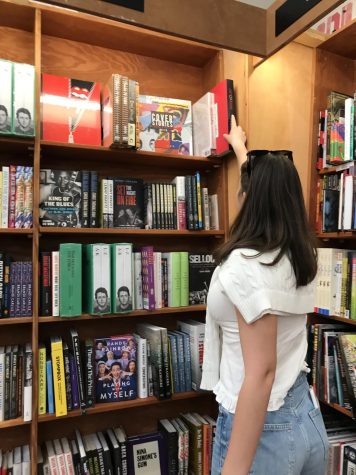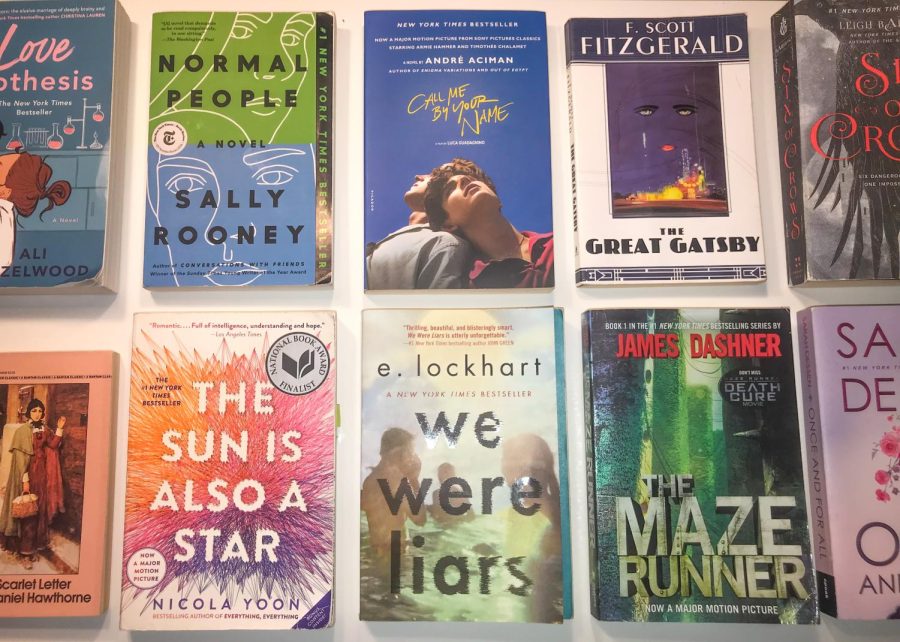Transforming books from page to screen
Popular books are often adapted into movies.
May 26, 2022
Some of the most successful movies and TV shows in recent years were stories borrowed from shelves. From “Bridgerton” to “The Great Gatsby,” it’s no wonder these projects have been so successful; the stories come with a pre-ordered audience – fans of the book that are excited to see a movie version.
“Adding people of color to Bridgerton made it a lot better than the books, which I thought were horrible. For me it was cool seeing my culture represented, and changing the story to adapt to the screen definitely made the show a lot more interesting than the books,” said Simran Pandey (‘23).
Although movie adaptations get a bad rep, the fact remains that 70% of the world’s top 20 grossing films are based on books. Regardless of the movie’s level of success, media exposure leads to more sales of the book, and more recognition for the author. The buzz surrounding an upcoming adaptation can also work against a project. Because people were so invested in the book, they now have opinions about how the movie should look.
“I like it when they make books into movies as long as they have the author involved in some way, that way it’s really based on the book and not a completely different story,” said Ava Kenitzer (‘24).
When the Percy Jackson books were made into a series, fans were disappointed that many things were changed because the author was left out of the adaptation process. For one, the character’s ages were changed, and major elements of the plot were left out. But some changes happen intentionally, like when author Rick Riordan cast a black actress to play Annabeth in the reboot, a character described in the book as having blonde hair and blue eyes. Although this change was controversial, Riordan noticed the importance of having representation in his films.
“I think there should be a lot of leeway with character descriptions. I think the actor should embody the character, the descriptive details are just surface details,” said English teacher John Benbenek.
This raises the question of how important it is for a movie to stick to its source material. If all a movie is doing is rehashing what happened in the book and not adding anything to it, what’s the point?
Books that are plot driven translate better to the screen, because their success didn’t stem from the book’s writing but rather the story being told. The “Harry Potter” series was widely successful because all the adventures that the golden trio had in the books were seen in the movies, and that’s all there was to preserve from the books.

On the other hand, there are cases when books have made the leap to the screen and fallen flat. Some people fail to realize that what makes a good movie and what makes a good book are two entirely different things. Companies see a book that is  fully formed and comes with an established fan base, and think the only thing they need to change is taking out the ‘he said’ ‘she said’ and the movie practically sells itself.
fully formed and comes with an established fan base, and think the only thing they need to change is taking out the ‘he said’ ‘she said’ and the movie practically sells itself.
“When you have corporations involved in decision making and focus grouping what people react to in pre-screenings, that interferes with the artistic vision of the writer,” said Benbenek.
John Green has written numerous YA novels that have made the NYT bestsellers list. “Looking for Alaska” and “Paper Towns” were made into a show and a movie respectively; both received terrible reviews. This is because the books focused almost entirely on the main character’s thoughts and feelings, which could only be shown through writing, and didn’t translate well onto the screen.
“Movies ruin reading modern novels for me a bit. For example, when I read Dan Brown’s “The Lost Symbol” there was a character that was so clearly a description of Morgan Freeman, that it seemed to me like he was trying to write the movie screenplay rather than a book,” said Benbenek.
The problem with adapting books is that the movie version will never live up to the expectations people have after reading the book. A book is an interactive experience. Watching a movie is more passive; all the work is done for you and you just need to sit back and enjoy. A book is an interactive experience. We spend hours with it, put in our time and lend our imagination to world building and character development. A hundred people could read the same book and each have a completely different mental image playing in their heads.
“In the show ‘One of Us is Lying’ I didn’t like how they portrayed the characters, and the actors they chose were different from my mental representation of them, which is why I didn’t enjoy it as much,” said Dhruvi Mehta (‘22).
Adaptations feel more like a lazy attempt to borrow success from famous books rather than come up with original ideas. For the most part, it’s best to leave cinema and literature to their separate worlds.





